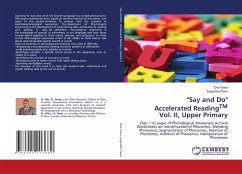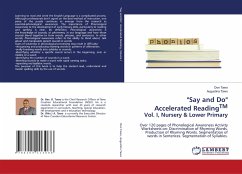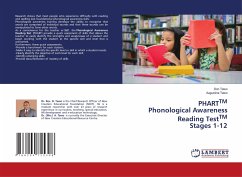
"Say and Do" Accelerated ReadingTM Vol. II, Upper Primary
Over 110 pages of Phonological Awareness Activity Worksheets on: Identification of Phonemes, Blending Phonemes, Segmentation of Phonemes, Deletion of Phonemes, Addition of Phonemes, Manipulation of Phonemes
Versandkostenfrei!
Versandfertig in 6-10 Tagen
41,99 €
inkl. MwSt.

PAYBACK Punkte
21 °P sammeln!
Learning to read and write the English Language is a complicated process. Although professionals don't agree on the best method of instruction, one piece of the puzzle continues to emerge from the research as essential-phonological awareness. The importance of Phonological Awareness to the development of early literacy skills, particularly to reading and spelling is clear. By definition, Phonological awareness is the knowledge of sounds, or phonemes, in our language and how those sounds blend together to form words, phrases, and sentences. In other words, Phonological awareness refers to the a...
Learning to read and write the English Language is a complicated process. Although professionals don't agree on the best method of instruction, one piece of the puzzle continues to emerge from the research as essential-phonological awareness. The importance of Phonological Awareness to the development of early literacy skills, particularly to reading and spelling is clear. By definition, Phonological awareness is the knowledge of sounds, or phonemes, in our language and how those sounds blend together to form words, phrases, and sentences. In other words, Phonological awareness refers to the ability to think about, talk about and manipulate speech sounds in words.Signs of weakness in phonological processing may result in difficulty:-recognizing and producing rhyming words or patterns of alliteration;-orally breaking words into syllables or sounds;-identifying whether a specific sound occurs in the beginning, end, or middle of a word;-identifying the number of sounds in a word;-blending sounds to make a word with rapid naming tasks;-repeating multisyllabic words.The purpose of this book is to help the student read, understand and master spelling skills by the use of sounds.












